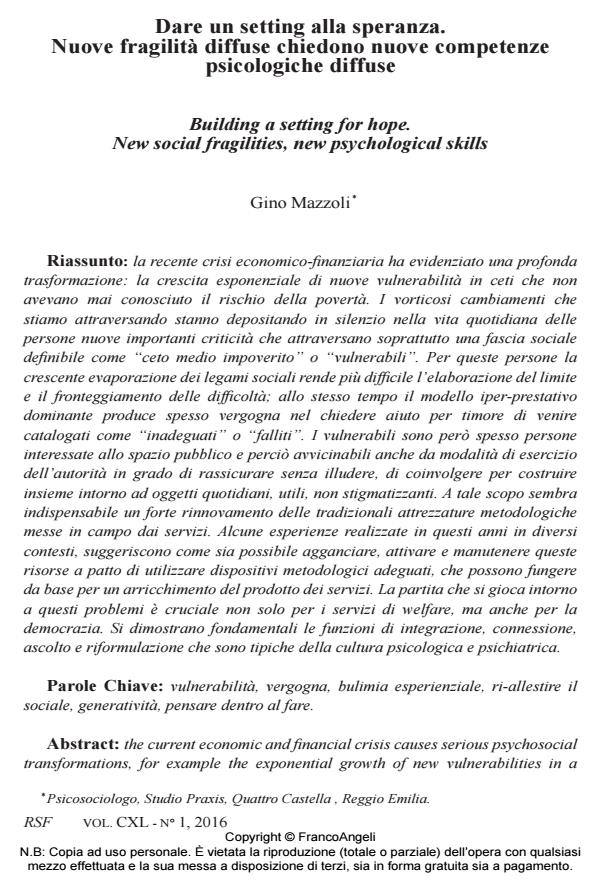Dare un setting alla speranza. Nuove fragilità diffuse chiedono nuove competenze psicologiche diffuse
Titolo Rivista RIVISTA SPERIMENTALE DI FRENIATRIA
Autori/Curatori Gino Mazzoli
Anno di pubblicazione 2016 Fascicolo 2016/1
Lingua Italiano Numero pagine 22 P. 65-86 Dimensione file 1699 KB
DOI 10.3280/RSF2016-001005
Il DOI è il codice a barre della proprietà intellettuale: per saperne di più
clicca qui
Qui sotto puoi vedere in anteprima la prima pagina di questo articolo.
Se questo articolo ti interessa, lo puoi acquistare (e scaricare in formato pdf) seguendo le facili indicazioni per acquistare il download credit. Acquista Download Credits per scaricare questo Articolo in formato PDF

FrancoAngeli è membro della Publishers International Linking Association, Inc (PILA), associazione indipendente e non profit per facilitare (attraverso i servizi tecnologici implementati da CrossRef.org) l’accesso degli studiosi ai contenuti digitali nelle pubblicazioni professionali e scientifiche.
La recente crisi economico-finanziaria ha evidenziato una profonda trasformazione: la crescita esponenziale di nuove vulnerabilità in ceti che non avevano mai conosciuto il rischio della povertà. I vorticosi cambiamenti che stiamo attraversando stanno depositando in silenzio nella vita quotidiana delle persone nuove importanti criticità che attraversano soprattutto una fascia sociale definibile come "ceto medio impoverito" o "vulnerabili". Per queste persone la crescente evaporazione dei legami sociali rende più difficile l’elaborazione del limite e il fronteggiamento delle difficoltà; allo stesso tempo il modello iper-prestativo dominante produce spesso vergogna nel chiedere aiuto per timore di venire catalogati come "inadeguati" o "falliti". I vulnerabili sono però spesso persone interessate allo spazio pubblico e perciò avvicinabili anche da modalità di esercizio dell’autorità in grado di rassicurare senza illudere, di coinvolgere per costruire insieme intorno ad oggetti quotidiani, utili, non stigmatizzanti. A tale scopo sembra indispensabile un forte rinnovamento delle tradizionali attrezzature metodologiche messe in campo dai servizi. Alcune esperienze realizzate in questi anni in diversi contesti, suggeriscono come sia possibile agganciare, attivare e manutenere queste risorse a patto di utilizzare dispositivi metodologici adeguati, che possono fungere da base per un arricchimento del prodotto dei servizi. La partita che si gioca intorno a questi problemi è cruciale non solo per i servizi di welfare, ma anche per la democrazia. Si dimostrano fondamentali le funzioni di integrazione, connessione, ascolto e riformulazione che sono tipiche della cultura psicologica e psichiatrica.
Parole chiave:Vulnerabilità, vergogna, bulimia esperienziale, ri-allestire il sociale, generatività, pensare dentro al fare.
- Senza corpo né tempo. Avventure della psiche individuale e sociale nell'epoca delle nuove tecnologie Gino Mazzoli, in RIVISTA SPERIMENTALE DI FRENIATRIA 2/2020 pp.7
DOI: 10.3280/RSF2020-002002
Gino Mazzoli, Dare un setting alla speranza. Nuove fragilità diffuse chiedono nuove competenze psicologiche diffuse in "RIVISTA SPERIMENTALE DI FRENIATRIA" 1/2016, pp 65-86, DOI: 10.3280/RSF2016-001005